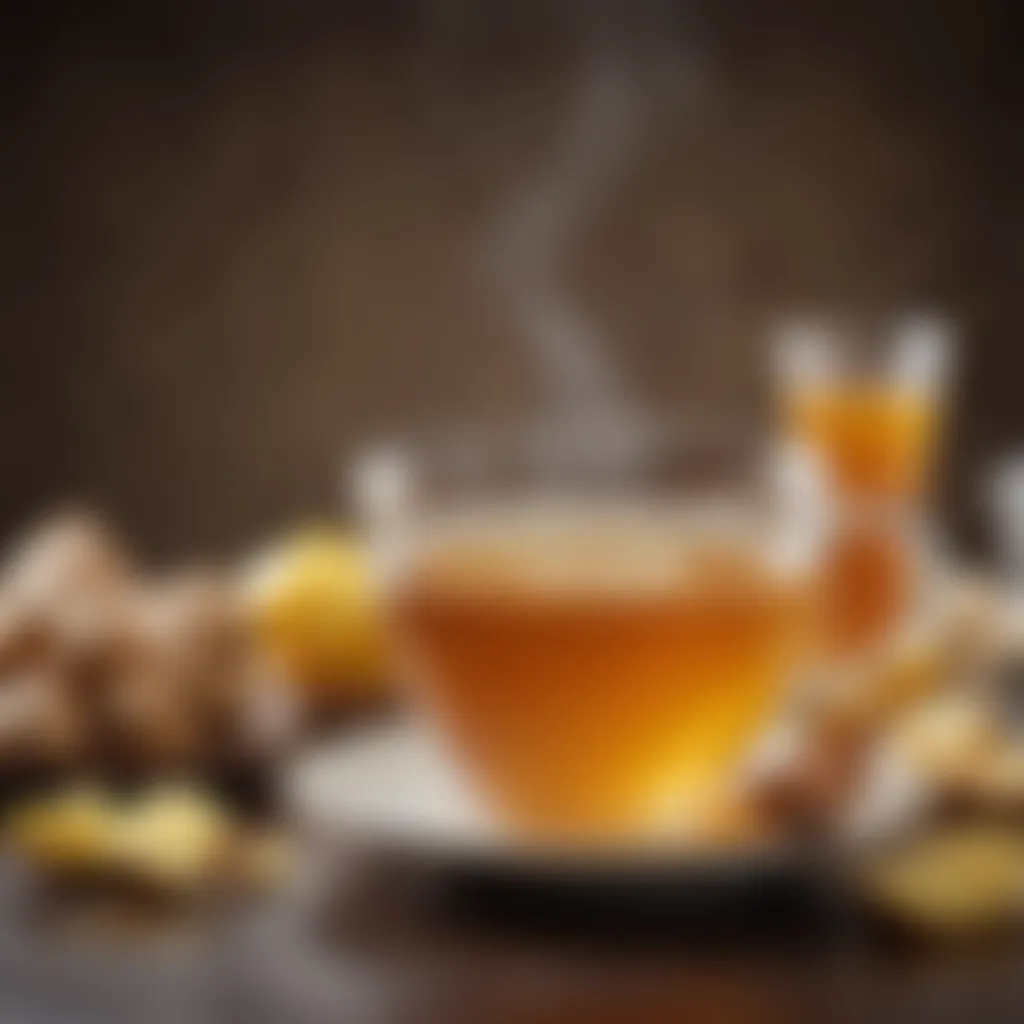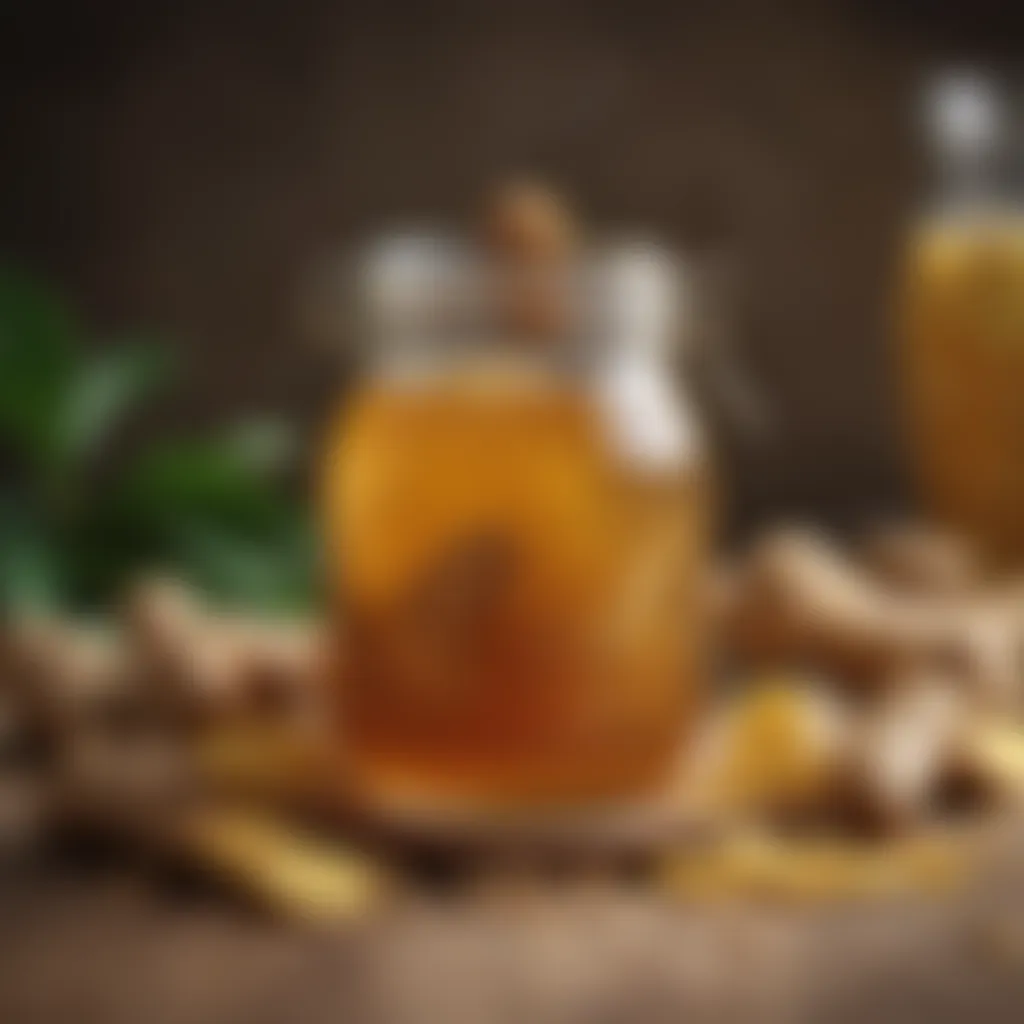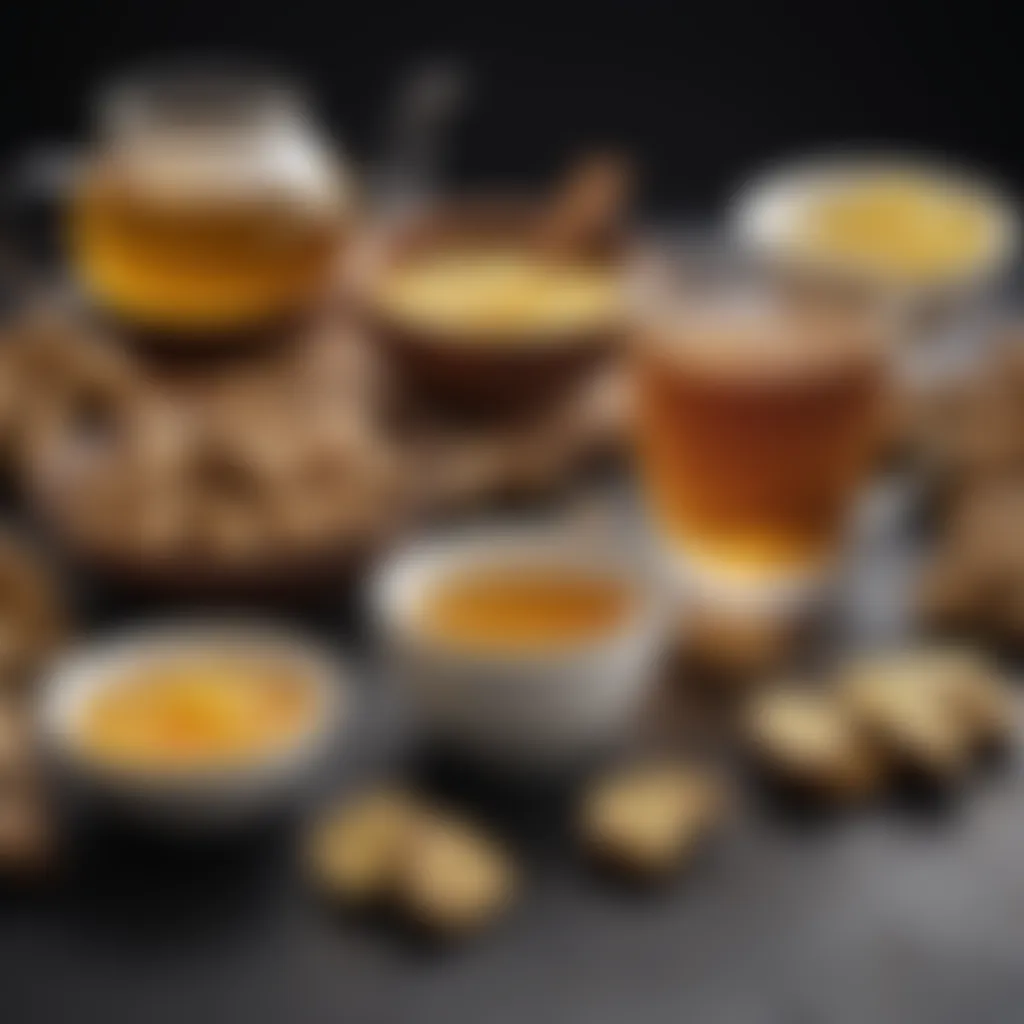Unlocking the Health Benefits of Ginger Tea with Honey


Intro
Ginger tea infused with honey is not just a delightful drink; it is a blend rich in health benefits and cultural significance. Both ginger and honey have been revered for centuries for their medicinal properties. Ginger, known for its pungent flavor and warming qualities, has properties that can aid digestion, alleviate nausea, and potentially reduce inflammation. Honey, with its natural sweetness, adds a layer of comfort and a host of additional health benefits. Together, they create a harmonious infusion that has gained popularity in modern wellness practices.
This article aims to explore the multifaceted benefits of this blend, including how to prepare it effectively at home. By understanding the individual and synergistic effects of ginger and honey, as well as their culinary applications, readers will gain insight into not only the preparation process but also the overall value of incorporating this tea into their daily routine. From ingredient selection to preparing the tea and enjoying the final result, we will provide a step-by-step guide tailored for those eager to elevate their health and culinary repertoire.
Ingredients:
To prepare a soothing cup of ginger tea with honey, you will need the following ingredients:
- Fresh ginger root: 2 inches, peeled and thinly sliced
- Water: 2 cups
- Honey: 1 to 2 tablespoons, to taste
- Lemon (optional): 1 slice for flavor
- Cinnamon stick (optional): 1 for added warmth
Gathering high-quality ingredients is crucial. Fresh ginger will provide the strongest flavor and health benefits. The honey should also be raw or organic to retain maximum nutrients.
Detailed Instructions:
- Prep the Ginger: Start by peeling the fresh ginger root with a spoon or a vegetable peeler. Slice it thinly to increase the surface area, allowing the flavors to infuse more effectively.
- Boil Water: In a small saucepan, bring the 2 cups of water to a rolling boil over medium-high heat.
- Add Ginger: Once the water is boiling, add the sliced ginger to the pot. If you're using a cinnamon stick, add it now as well.
- Simmer: Reduce the heat to low and let the mixture simmer for about 10 minutes. This allows the ginger to release its essential oils and create a rich flavor.
- Strain the Tea: After 10 minutes, remove the pot from heat. Strain the ginger tea through a fine mesh sieve into a teapot or cup to remove the ginger slices (and the cinnamon stick, if used).
- Sweeten: Add honey to taste while the tea is still warm. Stir well to dissolve the honey completely.
- Add Lemon: If desired, add a slice of lemon to enhance the flavor and increase vitamin C content.
- Serve: Pour the tea into cups and enjoy hot.
Technical Aspects:
- Temperature settings: Use medium-high heat to boil water and then reduce to low heat for simmering.
- Timing specifics: Simmer for exactly 10 minutes to achieve the best flavor. Over-simmering may result in bitterness.
- Critical techniques: Slicing ginger thinly and straining the tea are vital for creating a smooth drinking experience
Cooking Process:
Start by ensuring all ingredients are ready. Once you have boiled the water, promptly add the ginger to prevent it from losing flavor. Control the heat to avoid boiling over and make sure to reduce it when simmering.
Properly straining the tea is essential to avoid bitterness and improve texture. Use a high-quality sieve to ensure no ginger pieces remain in the final cup.
Troubleshooting Tips:
- Too strong: If your tea is too strong, dilute it with hot water.
- Too sweet: If the tea becomes overly sweet, add a bit more hot water or squeeze in a slice of lemon to balance the flavors.
- Bitterness: If the ginger is left to steep too long, it may taste bitter. Next time, keep track of your simmering time more closely.
Prologue to Ginger Tea with Honey
Ginger tea with honey is more than just a comforting beverage. This combination has longstanding historical roots and cultural significance. Its importance stretches across various cultures and regions, where it is widely consumed for its extensive health benefits and pleasant flavor.
Historical Context
The use of ginger as a medicinal herb can be traced back thousands of years. Ancient Chinese and Indian texts reference ginger in their healing practices. Honey, on the other hand, has served as a natural sweetener for millennia and has found a place in several traditional remedies.
Together, these ingredients have created a time-honored beverage that numerous generations have enjoyed. They have made their mark in literature and medical texts throughout history. The trend continues today, with various communities incorporating ginger tea with honey into their daily routines.
Cultural Significance
Ginger tea with honey is cherished in many cultures around the globe. In India, for example, chai made with ginger and honey is a staple that reflects hospitality and warmth. It signifies comfort and healing, often served during social gatherings or when one is unwell.
In Middle Eastern cultures, this tea is sometimes steeped with spices, further enhancing its flavor and benefits. It is regarded as a remedy for restoring balance and promoting well-being.
In Western societies, the beverage has gained popularity as part of health-conscious diets. It is often recommended by wellness bloggers and health practitioners alike for its numerous health benefits. This blend epitomizes the fusion of culinary arts with traditional healing practices.


Nutritional Components
Understanding the nutritional components of ginger tea with honey is crucial for recognizing its potential benefits. Both ginger and honey contain various nutrients that contribute to health and wellness. This section discusses the essential nutrients present in ginger and honey, as well as how these components work together synergistically to enhance overall well-being.
Ginger: Key Nutrients
Ginger is a rich source of several important nutrients. Some of its key components include:
- Gingerol: This is the main bioactive compound in ginger. Its anti-inflammatory and antioxidant properties are well-documented. Gingerol may help reduce oxidative stress in the body.
- Vitamins: Ginger contains small amounts of vitamins B6 and C. Vitamin B6 plays a role in metabolism, while vitamin C supports the immune system and helps in collagen production.
- Minerals: Ginger also provides essential minerals such as potassium and manganese. Potassium is vital for heart health, while manganese is important for bone formation and metabolism.
Including ginger in your diet can offer a variety of health benefits due to these nutritional elements.
Honey: Nutritional Profile
Honey is not only a sweetener but also contains numerous health-promoting elements. Its nutritional profile includes:
- Natural Sugars: Honey primarily consists of fructose and glucose, which provide a quick source of energy.
- Antioxidants: Honey contains antioxidants like phenolic acids and flavonoids. These compounds help combat free radicals in the body, which are linked to aging and various diseases.
- Vitamins and Minerals: Honey also has small quantities of vitamins B6, C, and several minerals, including calcium, iron, and magnesium. These nutrients contribute to overall health and are beneficial for various bodily functions.
Using honey as a sweetener can provide not only flavor but also additional nutrients compared to refined sugars.
Synergistic Effects
When ginger and honey are combined, their health benefits can be enhanced due to their synergistic effects. This partnership magnifies certain properties:
- Enhanced Antioxidant Activity: The combination of antioxidants found in ginger and honey can provide greater protection against oxidative stress. This boost may help to improve overall health and reduce the risk of chronic diseases.
- Anti-inflammatory Properties: Both ginger and honey are known for their anti-inflammatory properties. When consumed together, they may further help reduce inflammation in the body, supporting conditions such as arthritis or respiratory issues.
- Digestive Aid: Ginger promotes digestion, while honey can soothe the digestive tract. Together, they can support gut health and alleviate issues such as nausea or upset stomach.
"The collaboration of ginger and honey creates a powerful duo that not only tastes good but can offer significant health advantages."
In summary, understanding the nutritional components of ginger and honey provides insight into how their individual qualities create enhanced health benefits when used together. This knowledge informs health-conscious individuals, especially housewives, on the advantages of integrating this tea into their daily routines.
Health Benefits of Ginger Tea with Honey
The consumption of ginger tea with honey provides a myriad of health benefits that enhance overall well-being. This herbal infusion is not only a delightful beverage but also a natural remedy with properties that have been recognized for centuries. Understanding these benefits is essential for anyone exploring natural health solutions. Moreover, the blend's nutritional components contribute significantly to its effectiveness. Below are details on the specific health benefits tied to this popular mix.
Anti-inflammatory Properties
Ginger is well-known for its anti-inflammatory characteristics. The active compounds in ginger, particularly gingerol, help reduce inflammation in the body. This property is crucial for individuals suffering from chronic inflammatory conditions, such as arthritis. By consuming ginger tea with honey, one can potentially alleviate some discomfort associated with inflammation. Honey also offers mild anti-inflammatory benefits, which can enhance the overall effect of ginger. Together, they provide a soothing solution for inflammation-related issues.
Digestive Health Improvements
Another significant health benefit of ginger tea with honey is its positive impact on digestive health. Ginger has been embraced in many cultures for its ability to mitigate nausea, bloating, and discomfort after meals. The compounds in ginger aid in digestion by increasing gastric motility, which helps food move through the digestive tract efficiently. Honey acts as a prebiotic, supporting beneficial gut bacteria. A daily cup of this tea can promote a healthier digestive system and enhance nutrient absorption.
Immune System Support
Ginger tea with honey serves as a natural immune booster. Ginger is rich in antioxidants and contains compounds that can help the body fight off infections and illnesses. Honey is also recognized for its antimicrobial properties, making this blend effective in promoting a healthy immune response. Regular consumption can help fend off common ailments like colds and flu, making it especially valuable during the changing seasons or times of increased illness.
Antioxidant Benefits
The antioxidant properties of ginger and honey are another highlight of this beverage. Antioxidants play a critical role in protecting the body against oxidative stress, which can lead to various chronic diseases. Ginger contains phenolic compounds, while honey is rich in flavonoids and other antioxidants. Together, they form a powerful combination that can support overall health. Antioxidants from this blend can help reduce the risk of chronic diseases such as heart disease and cancer.


Respiratory Health Enhancement
Ginger tea with honey can be particularly beneficial for respiratory health. Ginger acts as a natural decongestant, aiding in the reduction of respiratory issues such as coughs and colds. Honey soothes the throat and has natural cough suppressive properties. This combination can alleviate symptoms of respiratory conditions, providing comfort during illness, while also promoting a quicker recovery.
Pain Relief Potential
Lastly, ginger tea with honey may have potential pain relief benefits. The anti-inflammatory effects of ginger contribute to pain management, particularly in conditions like headaches or muscle soreness. Some studies have indicated that ginger can be as effective as non-steroidal anti-inflammatory drugs for certain types of pain. Adding honey can make the beverage more palatable without sacrificing its medicinal properties, encouraging more people to incorporate it into their daily routines.
"The combination of ginger's active compounds and honey's soothing qualities forms a natural remedy that meets various health needs."
In summary, ginger tea with honey encompasses a wide range of health benefits, from reducing inflammation to enhancing digestive health. Understanding these advantages can encourage informed dietary choices, providing a holistic approach to wellness.
Preparation Methods
Understanding the preparation methods of ginger tea with honey is crucial for maximizing its benefits. The way you brew this tea can significantly influence its flavor, nutritional quality, and health effects. Each method brings forth unique characteristics, ensuring that this beverage can cater to various tastes and health goals. Knowing how to effectively prepare ginger tea can enhance not only its taste but also its therapeutic properties.
Traditional Recipes
Traditional recipes for ginger tea often involve simple ingredients, focusing on the natural flavors of ginger and honey. A common method is to bring water to a boil, then add freshly sliced ginger. Allowing it to steep for 10 to 15 minutes allows the ginger's essence to infuse into the water, creating a robust flavor. After steeping, you can sweeten the tea with honey, which adds a natural sweetness and additional health benefits.
Another traditional approach utilizes dried ginger rather than fresh. In this case, you might need to adjust the amount, as dried ginger is more concentrated. Regardless of the choice of ginger, using high-quality honey will enhance both flavor and health benefits.
"Traditional methods preserve the authentic flavor and health properties of ginger tea, connecting us to cultural practices while nourishing the body."
Modern Variations
With the increasing interest in health and wellness, modern variations of ginger tea are evolving. These recipes may incorporate additional ingredients such as turmeric, lemon, or even cayenne pepper, creating a wellness elixir.
One popular modern variation is combining ginger with green tea. The combination offers both the stimulating effects of caffeine and the anti-inflammatory properties of ginger.
Another variation is cold ginger tea, where ginger is steeped in hot water and then chilled, creating a refreshing drink ideal for warm weather. Many also choose to add flavored syrups or sparkling water to the mix for unique twists.
Tips for Optimal Brew
For the best results when making ginger tea with honey, consider the following tips:
- Use Fresh Ingredients: Always opt for fresh ginger root when possible. It has a stronger flavor and more health benefits compared to dried ginger.
- Water Temperature: Avoid boiling water directly after adding ginger. Instead, let the water cool slightly before adding the ginger to preserve its volatile compounds.
- Steeping Time: Steep the tea longer for a stronger flavor and more benefits. However, balance this with personal taste preferences.
- Storage: If making in larger batches, store leftover tea in the refrigerator. It can be consumed cold or reheated, maintaining its integrity for several days.
These preparation methods and tips set the foundation for a flavorful and healthful experience with ginger tea and honey, enabling enthusiasts to tailor their beverage to their unique preferences and health goals.
Potential Drawbacks and Considerations
While ginger tea with honey offers numerous health benefits, it is essential to acknowledge potential drawbacks and considerations. Understanding these factors can help one make informed decisions regarding its consumption. Like any food or beverage, moderation is key. Below are specific elements to consider while enjoying this popular drink.
Allergic Reactions
Ginger and honey are generally safe for most individuals, but some may experience allergic reactions. People with allergies to plants in the Zingiberaceae family should exercise caution with ginger. Symptoms may include skin irritation, itching, or gastrointestinal distress. Additionally, honey can cause allergic reactions in those with pollen allergies or specific bee-related allergies. Always be aware of individual sensitivities and consult a healthcare professional if unsure.
Blood Thinning Effects


Ginger has natural blood-thinning properties, which may be beneficial in preventing blood clots. However, excessive consumption could increase bleeding risk. This is particularly crucial for individuals on anticoagulant medications like warfarin. If someone is taking such medications, it is recommended to discuss ginger tea's impact with a healthcare provider. Monitoring intake is vital to ensure safety, especially if there are underlying health concerns.
Interactions with Medications
Ginger and honey can interact with certain medications. Ginger may affect how blood sugar levels are managed, which can alter the effectiveness of diabetes medications. Likewise, honey, being a natural sugar, can raise blood sugar levels. It is critical for diabetic individuals to monitor their blood sugar levels when consuming ginger tea with honey. Additionally, ginger may enhance the effects of medications that impact blood pressure. Therefore, anyone on prescribed medications should consult with their healthcare provider to assess potential interactions.
It is crucial to approach any herbal remedy with caution, especially if one is on medications or has existing health issues.
In summary, while ginger tea with honey is widely appreciated for its health benefits, it is important to consider potential allergic reactions, blood-thinning effects, and interactions with medications. By being aware of these factors, individuals can enjoy their tea while minimizing risks.
Ginger Tea with Honey in Different Cultures
Ginger tea with honey has gained recognition around the world not just for its flavor, but also for its health benefits and cultural meanings. In various cultures, this beverage serves more than just a thirst-quencher; it embodies traditions, practices, and even beliefs that span generations. The exploration of ginger tea with honey within different cultures gives significant insight into how this blend is perceived and utilized in daily life. It showcases the intersection of tradition, health, and culinary art, revealing methods and meanings that vary regionally.
Asian Practices and Beliefs
In numerous Asian cultures, ginger tea with honey is seen as a remedy for various ailments. For instance, in Chinese medicine, ginger is regarded as a warming herb. It is often used to combat cold symptoms, nausea, and digestive issues. The addition of honey enhances its properties, making this tea not only soothing but also a vehicle for boosting overall health.
In India, ginger tea, or chai, is a staple in many households. It is brewed with spices and sweetened with honey or sugar. The drinking of ginger tea is associated with hospitality and community. Families often share this tea during gatherings, emphasizing its role in social culture alongside its health benefits.
Asian practices highlight the belief that ginger tea with honey can aid in restoring balance to the body. These deep-rooted beliefs provide cultural significance, promoting this beverage as more than a drink—it becomes a means of care and connection.
Middle Eastern Influence
In the Middle East, ginger has a long history in traditional medicine. Ginger tea sweetened with honey is a widespread beverage, often served during the cooler months. This region values the warming effects of ginger against cold weather, making it a common choice in homes.
Aside from its health benefits, honey is also a symbol of hospitality in Middle Eastern culture. When serving guests ginger tea with honey, the host provides an invitation into their home and their traditions. This tea symbolizes warmth, care, and generosity, reinforcing bonds within communities.
Moreover, both ginger and honey are acknowledged for their potential medicinal effects. When combined, they are believed to help with respiratory issues or to soothe sore throats, thus maintaining their importance in local healing practices.
Western Adaptations
In Western cultures, ginger tea with honey has seen a rise in popularity particularly due to health trends and wellness movements. Many in the West turn to this beverage for its perceived health benefits, such as aiding digestion and combating colds.
The tea is often enjoyed as a comforting drink during winter or as a remedy for seasonal illnesses. Various brands sell pre-packaged ginger tea with honey, making it easily accessible. However, the homemade version is still cherished, especially among those who value organic and natural ingredients.
In addition, Western cuisine has adapted ginger tea into various forms. For example, it can be found in lattes or used as a base for cocktails. This adaptability shows how culinary influences merge and evolve over time, honoring the traditional while integrating new concepts and flavors.
In summary, ginger tea with honey transcends boundaries, illustrating its significance in different cultures through its health benefits, social connections, and culinary uses.
The End
In this article, we explored the many advantages of ginger tea with honey. Emphasizing its importance for health and wellness, we have detailed various benefits and considerations. From nurturing digestive health to enhancing immune support, ginger tea with honey serves as a versatile remedy in both culinary and medicinal applications.
Summary of Benefits
Ginger tea with honey offers a range of benefits that can enrich one's life:
- Anti-inflammatory properties that may reduce symptoms of various conditions.
- Digestive aid, helping alleviate discomfort and promoting gut health.
- Support for the immune system, acting as a natural protector against colds and infections.
- Rich antioxidant content, contributing to overall health and aging gracefully.
- Respiratory health, which improves congestion and breathing.
- Pain relief potential, assisting with migraines or muscle aches.
These benefits highlight the blend's capability to enhance both physical and mental well-being.
Final Thoughts
Ginger tea with honey is more than a comforting beverage. It embodies cultural significance and personal wellness practices across the globe. Making time for this simple drink can be an investment in one's health. With minimal preparation, individuals can enjoy its robust flavors and therapeutic attributes. As our understanding of natural remedies grows, this tea continues to stand out as a practical choice for people seeking holistic well-being in their daily lives.







